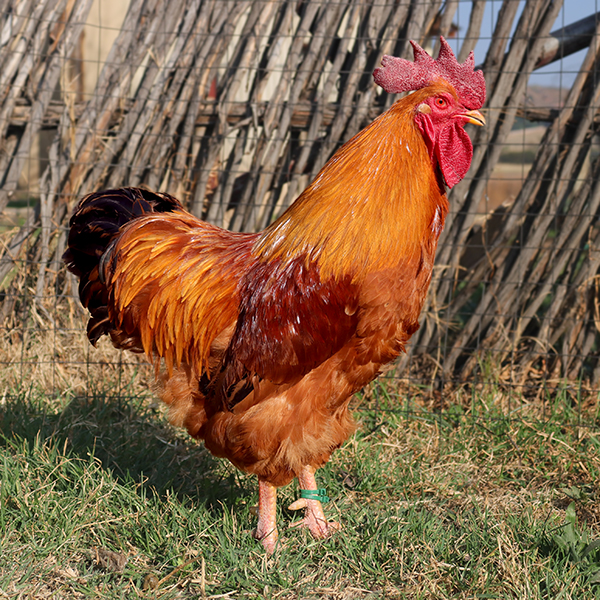The New Hampshire is a classic American dual-purpose breed that emerged in the early 20th century from Rhode Island Red stock. It was specifically bred to mature rapidly, feather early, and offer reliable yields in both eggs and meat. These qualities make it a strong and practical option for small-scale farmers and backyard keepers.
Egg Production
New Hampshire hens typically begin laying between 5-6 months of age. Under good management, they produce around 200-280 large brown eggs annually, with many laying consistently through winter when given proper lighting and care. In heritage lines, a steady 200-220 eggs per year is common, while some high-performing lines may reach up to 280 eggs. After their first few years, productivity may decline as hens age.
Appearance
These birds have a sturdy and muscular build with broad bodies and deep breasts. Their plumage is usually a rich chestnut red, sometimes with pale yellow highlights or black-tipped feathering on the neck and wings. Roosters, in particular, can sport black tail feathers contrasting with their red bodies. They feature a single comb, red wattles and earlobes, and yellow shanks. Mature hens weigh around 3 kg, while roosters reach about 3.9 kg.
Temperament and Behaviour
New Hampshires are generally calm and friendly, but can become assertive around feeders or with more timid flock mates. Their temperament may range from gentle to somewhat irritable, particularly during breeding season, and roosters should be handled with care around children. They are good foragers, intelligent, and adaptable to both free-range and confined environments.
Broodiness and Mothering
This breed tends toward occasional broodiness and is regarded as a good sitter and attentive mother. Hens that go broody can be used to hatch chicks from other birds. Their maternal instincts are reliable and make them useful for natural reproduction in sustainable flock systems.
Suitability and Care
New Hampshires are hardy birds that thrive in a variety of climates, with strong adaptability to both hot and cold conditions. They are easy to care for and perform well with basic housing, feed, and predator protection. Their fast growth and solid bodies make them suitable for both egg layers and meat production. Their resilience and straightforward management needs make them especially valuable for homesteaders and beginners.
Summary
The New Hampshire chicken is a versatile and dependable dual-purpose breed. Key attributes include:
-
Lays between 200 and 280 large brown eggs per year
-
Starts laying at approximately five to six months old
-
Robust and muscular body frame
-
Temperament ranges from calm to food-competitive; good mothering ability
-
Hardy and easy to manage across varying environments
This breed remains a sound choice for anyone seeking productivity, durability, and adaptability in their flock.
New Hampshire
- Product Code: 450-0100
- Availability: Call For Availability
-
R0.00


